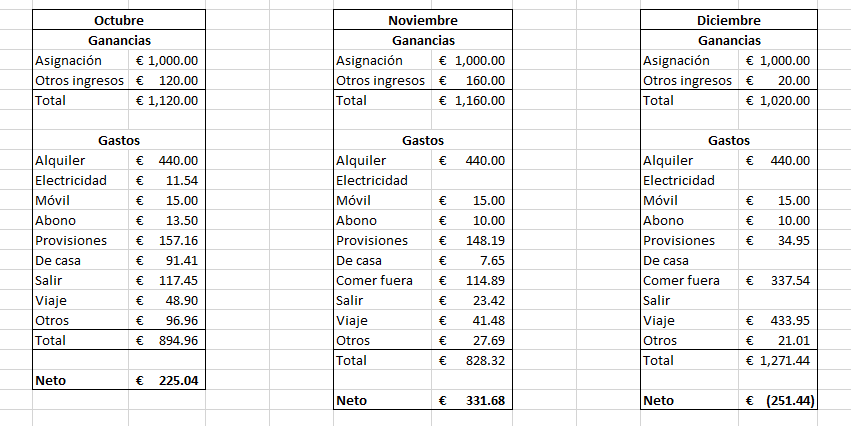€1,000/Month Is Easier to Live on Than You Think
One of the things that has surprised me the most about my experience in Spain so far is how fair a salary €1,000/month is. I didn't think that would be nearly enough to last me a whole month, but I promise that if you're smart about your spending, you won't have to dip into your savings. (Of course, you will need to arrive in Spain with some savings because you won't be paid until the end of October). I realize that everyone has different spending priorities, so the following reflects what my monthly budget looks like for me now that I am settled into life in Madrid.
Income
As I'm sure you already know, your salary will be €1,000/month, paid to you as a lump sum at the end of every month. €1,000/month is enough to cover the cost of living in Madrid, but I do recommend finding a way to earn a bit of extra money. Most auxiliares give private English lessons or take care of children. I do two hours of private lessons per week for €20/hour, so I end up making about €160/month on top of my salary. That might not sound like much, but given how much cheaper the cost of living is in comparison to the United States, €160 goes a long way.
Rent
My rent is €440/month and it includes all utilities except for electricity. I rented a room in a four-bedroom apartment in the Pacífico neighborhood of Madrid. During the housing search, I set the maximum I was willing to pay for rent at €500/month. This meant that most of the rooms I viewed were outside of the city center because in general, the closer you live to the center, the more expensive rent will be. I chose to live farther out of the city center and pay less for my rent so that I would have more money left over for travel and other experiences.
Utilities
Utilities are already included in my rent, with the exception of electricity. My roommates and I split the payment of the electricity bill between the four of us, and thus far it has come out to about €15/month each. Because of recent trends in utility costs, I would recommend finding a place where some or all of the utility costs are already included in the rent and therefore are fixed every month.
Phone Service
It's much cheaper to contract a line with a Spanish carrier or to buy a prepaid SIM card from a Spanish carrier than to purchase an international plan with your American carrier. You will get different allowances based on how much you pay per month. I have a prepaid SIM card and I pay €15/month for 100 GB of data, 800 international minutes and roaming (and I haven't come anywhere close to using it all in one month).
Transportation
Luckily for me, I am considered a joven (25 years old and younger), so for just €20/month, I get unlimited rides on all buses, metros and trains within the entire community of Madrid. If you are 26 and older you will pay by distance traveled, so your transportation costs will largely depend on the distance between your apartment and your school. No matter your age, the Madrid public transport card (known as an abono) is essential to make your commute quick and cost-effective.
Groceries/Household Items
After rent, I spend the biggest chunk of money each month on groceries and household items (i.e. soap, paper towels). My roommates and I share certain household items but buy our own groceries. I typically make all of my meals for myself during the work week and will eat out a few times over the weekend. My grocery bill comes out to about €160/month. I recommend making food at home more often than eating out to keep food costs down.
Disposable Income
Adding together all of my essential expenses for the month (rent, utilities, phone, transportation, groceries) brings me to approximately €650/month, leaving over about €350/month to spend as I choose. Everyone is going to choose to spend this money differently based on their priorities. Personally, I choose to spend the majority of my disposable income on food and drink, activities around Madrid and travel. This is why I recommend finding another source of income, like private lessons: to have more disposable income to spend as you please.
I hope that now you see that living on €1,000/month can be done, and how. The two biggest suggestions I have to ensure that you stay within your budget are to track your spending and to identify early on what your spending priorities are. If you do those two things, I promise that you can make €1,000/month work in Madrid. Don't let the salary be what holds you back from an incredible experience teaching abroad in Madrid!
Related Posts

About Me: Creativity, Teaching, and a New Life in Madrid
Hi! I’m Emily, and I just moved to Madrid last week to teach English as an auxiliar de conversación for the year. I joined CIEE to do the Teach In... keep reading
Melisandra in Madrid
Hello reader! My name is Melisandra. I'm from Philadelphia, Pennsylvania. My great-grandfather was born in Bilbao, and I am 3rd generation Latina/ Hispanic. My Abuelitos are a big inspiration and... keep reading

5 of the Coolest Cocktail Bars in Madrid
Walk into any bar or restaurant in Madrid and you’ll have all the typical drinks available to you- beer, wine, basic cocktails, etc. However, Madrid is also home to many... keep reading

